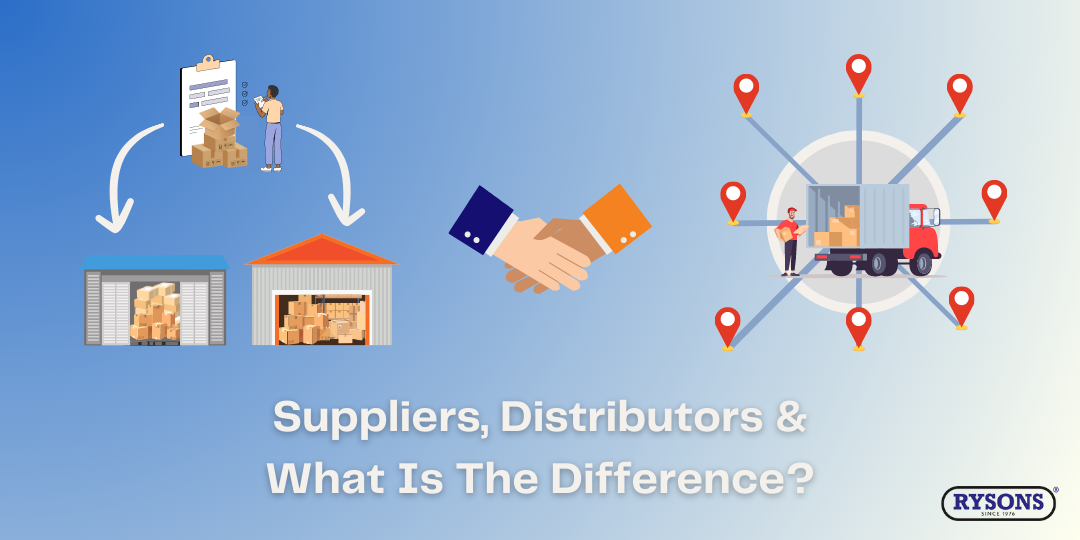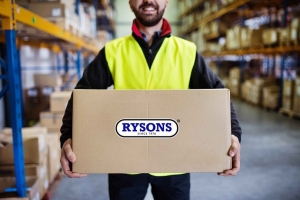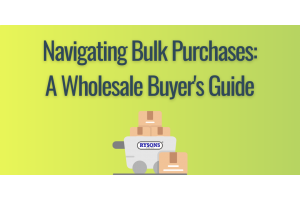Suppliers VS Distributors and What Is The Difference?

What is a supply chain?
A supply chain is an entire network of organisations (directly or indirectly interlinked) that are interdependent in serving the same consumer/customer. It can consist of:
- Supplier: they provide goods which they can either produce or import from a manufacturer.
- Distributor: deliver to retailers & other end-users.
- Retailers: supply the product to the end-user/consumer.

What is a supplier?
A supplier is a business-to-business individual or business that provides goods or services. They can either produce (be the manufacturer) or import the products (from the manufacturer). Their responsibility is to sell the goods to a distributor who then resell the goods to consumers.
Suppliers are the important link between the manufacturer and distributor. They are responsible for making sure that communication is present & that the products are of good quality.
They can either specialise in a specific type of good or service, or offer a range of goods/services catered to the needs of each individual customer. Sometimes, they also provide services such as installation, repair and maintenance of the goods they supply.
When you think of suppliers you might think large, multinational corporations, however they can also be small local businesses! Whether they're an established company or just getting started, suppliers play a crucial role in ensuring businesses are able to access the goods and services they need.

What is a Distributor?
When you look at the supply chain, distributors are the people in contact with suppliers to purchase goods in bulk from them- in other words, they’re the middleman. These distributors then sell the goods on to retailers and other end-users (such as wholesalers like Rysons) in smaller quantities, but at a higher price.
They are such an important part of keeping supply chains running smoothly by keeping the contact between suppliers and end-users. Again, distributors (like suppliers) can either specialise in a specific type of goods or service, or on the other hand they could offer a range of goods or services catered to the needs of each individual customer. They can also provide services such as delivery, storage & marketing.
Distributors help with the efficiency of the supply chain and the cost-effectiveness of goods transactions. Their expertise and knowledge of the market plus their established networks from working with a wide range of businesses are highly effective in helping businesses grow profit and reach new customers.

4 types of distributors:
- Exclusive: businesses sign an agreement with the distributor stating that this particular distributor is the only one allowed to sell your product within a certain region. This helps businesses to control how their products are marketed and sold.
- Intensive: this works well with customers who don’t have as much brand loyalty and instead are more focused on the availability of products, so this distributor can help with supplying the businesses products to retailers and others.
- Direct: this gives a quick turn around time as this distributor sells products directly to shops, allowing faster restocks in the shops.
- Selective: when working within niche industries & when high quality customer service is wanted, this distributor is the best.
What is a wholesaler?
Wholesalers are B2B companies that sell products in bulk/large quantities at discounted/low prices to other businesses and retailers. They can manufacture some of their product lines in order to provide the best prices to their customers. Wholesalers can also out-source to suppliers for some of their other products.
Distributor vs Wholesaler
Whilst the two can be seen to be very similar, the key defining feature to distinguish the two is that distributors are never the manufacturer of goods.
Supplier vs Distributor
The difference between the two is that whilst suppliers are responsible for the production or manufacturing of goods, distributors purchase the goods from suppliers and then sell it on to retailers/end-users. So in effect, generally, the supplier works closely with manufacturers whereas the distributor works closely with retailers.
Whilst both these play important roles in the supply chain they differ in their speciality.
Suppliers focus on:
- Production.
- Quality.
- Delivery of products.
Distributors focus on:
- Sales.
- Marketing.
- Distribution of products.
In certain cases the supplier acts as distributor via selling products directly to end-users, and sometimes distributors offer services such as installation or technical support. Suppliers may provide services such as installation, repair, and maintenance of the products they sell. Certain distributors also provide services such as delivery, storage, and marketing. However, mainly, suppliers will be the ones to offer services in relation to the goods they sell, while distributors focus on the sales & distribution.
Overall, these two work together in order to ensure a smooth supply chain and the efficient & effective delivery of goods to their end-user!






